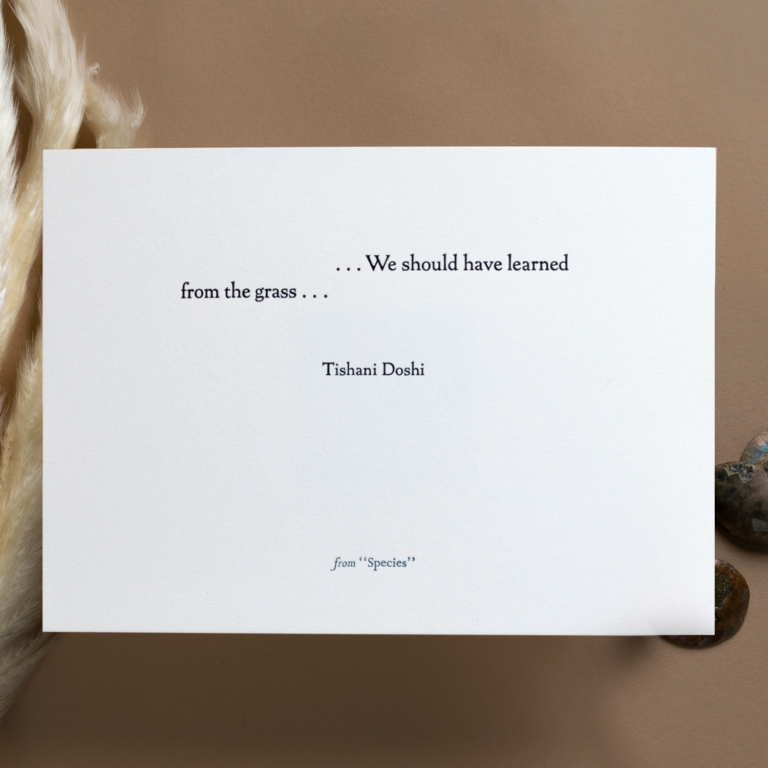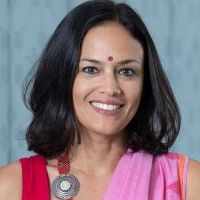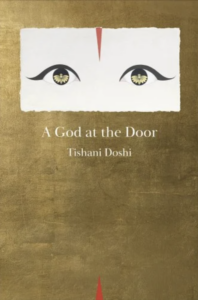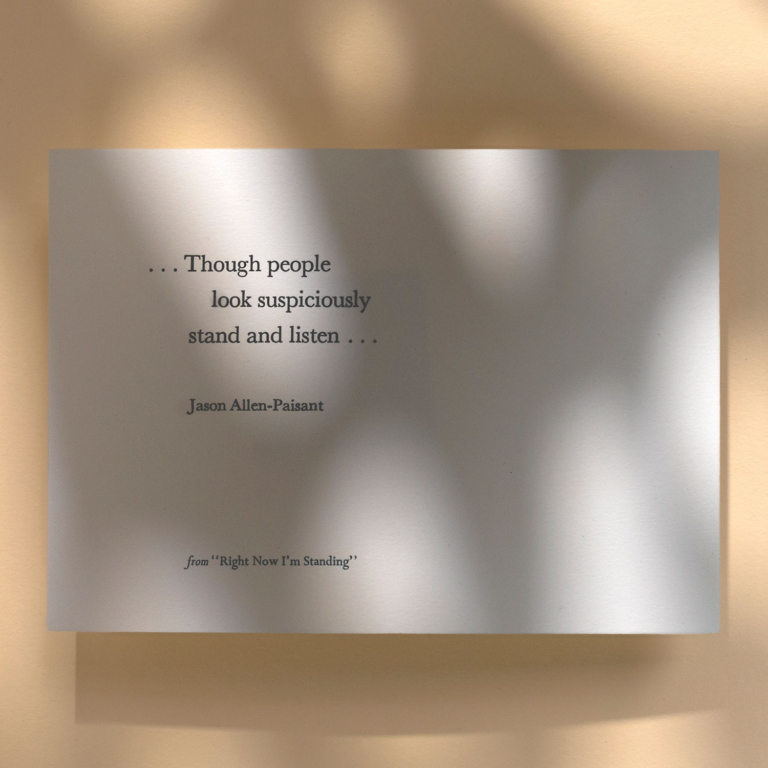Tishani Doshi
Species
In a fantastical poem about the future, Tishani Doshi explores the present. She imagines a future where agriculture, forestry, and cultivation are things of the past, distant memories learned by humans existing on other planets, or on intergalactic spaceships. That distant future is reflecting on how it should have learned from the grass, abundant, generous, sustainable. This poem of dystopian magic-realism is more real than magic, offering advice on thriving, while noting the knife-edge of self-destruction so familiar to human behavior.

Letterpress prints by Myrna Keliher | Photography by Lucero Torres
Guest

Tishani Doshi was born in the city formerly known as Madras in 1975. A poet and dancer, she has published seven books of poetry and fiction. Her essays, poems and short stories have been widely anthologized. She is Visiting Associate Professor of Practice, Literature and Creative Writing at New York University, Abu Dhabi. ‘A God At The Door’, was published in 2021.
Transcript
Pádraig Ó Tuama: My name is Pádraig Ó Tuama, and one of the reasons I love poetry is because you could say, in a certain sense, that most if not all poems are a certain reflection on time — what happened then? How am I thinking about it now? How do I imagine and reflect on that in the future? Over and over again in poetry, time is at its work. And paying attention to time in a poem is one of the ways that we can open up to its great gifts.
“Species” by Tishani Doshi:
“When it is time, we will herd into the bunker of the earth
to join the lost animals – pig-footed bandicoot, giant sea
snail, woolly mammoth. No sound of chainsaws, only
the soft swish swish of dead forests, pressing our heads
to the lake’s floor, a blanket of leaves to make fossils
of our femurs and last suppers. In a million years
they will find and restore us to jungles of kapok.
Their children will rally to stare at ancestors.
Neanderthals in caves with paintings of the gnu
period. Papa Homo erectus forever squatting over
the thrill of fire. Their bastard offspring with prairie-size
mandibles, stuttering over the beginnings of speech. And finally,
us – diminutive species of Homo, not so wise, with our weak necks
and robo lovers, our cobalt-speckled lungs. Will it be for them
as it was for us, impossible to imagine oceans where there are now
mountains? Will they recognize their own story in the feather-tailed
dinosaur, stepping out of a wave of extinction to tread over blooms
of algae, never once thinking about asteroids or microbial stew?
If we could communicate, would we admit that intergalactic
colonization was never a sound plan? We should have learned
from the grass, humble in its abundance, offering food and shelter
wherever it spread. Instead, we stamped our feet like gods,
marveling at the life we made, imagining all of it to be ours.”
[music: “Angel Tooth” by Blue Dot Sessions]
I love science fiction, and I loved the imagination of this poem, imagining some kind of museum of the future, where the children of a million years from now are looking back on us and trying to imagine our lives now. And there’s us sophisticated people, with smartphones and robots, and in this museum of the future, we’re alongside dinosaurs. It’s a very clever poem. I mean, Tishani Doshi writes funny poems that delight in words like “gnu,” here. And as well as being a clever and funny poem, it plays with time, and it sees today through the lens of the future, for whom we’ll be history. And so therefore, she’s doing something very, very interesting about the present.
Toward the end of this poem, there’s this question, “If we could communicate, would we admit that intergalactic / colonization was never a sound plan?” Partly, the imagination of the children of the future, in a million years looking at us in a museum, is perhaps imagining that they’ve had to find some other planet to populate. And what Tishani Doshi is saying is, is there any evidence now that the colonizations of future planets wouldn’t make all the mistakes of colonizations now? Is there any way to be human and spread with generosity and shelter and food, rather than being humans spreading the ways that European colonizations have done?
[music: “Invicta” by Blue Dot Sessions]
This poem opens with the words “When it is time.” And when it is time for what? You know, is it about this particular period of the Earth’s history evolving, or is it when we’ve destroyed ourselves or destroyed the Earth? And then the poem goes on to describe how we humans will join other animals: the pig-footed bandicoot, the giant sea snail, and the wooly mammoth. So many cultures across the world have a great flood story, together then with something like a boat or an ark or a box in which animals were gathered and living beings were saved from the great flood.
And this poem is almost like an echo of that, except it’s not. There’s no resolution at the end of it, or happy ever after ending. It’s just evolution and extinction and history, and looking back. The poem also recognizes what can’t be preserved: the “swish swish” of forests, and lakes, and even, then, the capacity to imagine what things used to be like. Those things can’t be brought into any ark or boat or any repository to preserve.
[music: “Every Place We’ve Been” by Gautam Srikishan]
This poem, in a certain sense, is in three parts. The first part imagines the gatherings of us, you know, alongside some animals and also the things that can’t be brought. And then the second part imagines the children of a million years from now coming to a museum and looking at us alongside Neanderthals; how naïve we’ll all seem to them.
But then the third part imagines us speaking back to the future. This line: “If we could communicate, would we admit that intergalactic / colonization was never a sound plan? We should’ve learned / from the grass.” So this poem, underneath the comic and science fiction elements of it, is really inviting a new relationship to the question of ownership and asks people to consider what it means to be on the Earth, from the point of view of the grass. The grass provides shelter and abundance. Even though there’s so much of it, it doesn’t take over in a way that’s dominant in a negative way; it takes over in a way that’s generous. And this poem invites people to think about being present on the Earth like that and to think of spreading in a way of sharing food and shelter.
Perhaps Tishani Doshi is saying that humanity’s tendency, or certain aspects of humanity’s population’s tendency, has been to destroy when we spread, initially or eventually. And there’s a question as to whether it’s possible to have a different kind of presence on the planet.
[music: “Bivly” by Blue Dot Sessions]
You know, in a poem that’s ostensibly about the future, imagining us when we will be a long-distant memory, there’s all kinds of things where we can recognize ourselves now. You know, there’s lost animals and chainsaws and dead forests, and lake’s floor uncovered by water. And then there’s “cobalt-speckled lungs,” whether speckled with cobalt because of mining or smoking, oceans’ extinction, colonization, and the practice of imagining everything to be ours. Those aren’t things about the future. Those are things about the present and the past. And so we can really recognize something about who we are right now is being articulated, is being brought into conversation through an imagined bewilderment of the future.
In that way, science fiction is always a revelation of the present, not about the future. When I was a boy, I used to imagine that science fiction was all about understanding how flying saucers would work. But the older I got, the more I realized that science fiction is always about the present.
[music: “First Grief, First Air” by Gautam Srikishan]
Tishani Doshi is a poet from India; she’s of Welsh and Gujarati origin. And as well as being a poet, she’s a renowned dancer. And her poems often make really contemporary references to things like Instagram or the Brazilian butt lift or Patrick Swayze. And they make use of these everyday, sometimes funny expressions in a way that brings them into conversation with serious world issues. And in this instance, a certain kind of science fiction is in conversation with climate change. And the legacy of ownership and dominance and colonization is being shown, too, in an imagination of what a future that’s bewildered by our present and our past.
The poem is centered on the page, which is a really unusual way for contemporary poetry to be presented. And so it kind of looks like it’s in the shape of an egg timer, a little bit broader at the top. It narrows in the middle and goes out again toward the end — not entirely like that, but it’s got a little bit of an image of an egg timer in it, the way that I look at it, which again makes me think of time: perhaps time running out; or somebody measuring time — not time a million years into the future, but time now — and wondering, what are we going to do now?
[music: “Levander Crest” by Blue Dot Sessions]
There’s another level of communication about time happening in this poem, because it isn’t only about imagining the future and imagining how the future will want to look back on us. It’s also about communicating with each other now. There’s this line: “If we could communicate.” This poem is yearning for a kind of meeting of minds across a chasm of experience and time. But it’s also, I think, hoping that communication can happen while there’s the possibility of preventing some extinctions, ways within which, even in the here and now, there’s a vast chasm between some people and other people.
“If we could communicate” — that’s one of the hopes. What would it be like to be able to communicate to each other about climate change, about the practices of colonization, in the here and now; not to wait until we’re all in a museum of the future, but to look at a way in which we can talk with each other now, in the hope of something vital to be done in the present?
[music: “Levander Crest” by Blue Dot Sessions]
“Species” by Tishani Doshi”
“When it is time, we will herd into the bunker of the earth
to join the lost animals – pig-footed bandicoot, giant sea
snail, woolly mammoth. No sound of chainsaws, only
the soft swish swish of dead forests, pressing our heads
to the lake’s floor, a blanket of leaves to make fossils
of our femurs and last suppers. In a million years
they will find and restore us to jungles of kapok.
Their children will rally to stare at ancestors.
Neanderthals in caves with paintings of the gnu
period. Papa Homo erectus forever squatting over
the thrill of fire. Their bastard offspring with prairie-size
mandibles, stuttering over the beginnings of speech. And finally,
us – diminutive species of Homo, not so wise, with our weak necks
and robo lovers, our cobalt-speckled lungs. Will it be for them
as it was for us, impossible to imagine oceans where there are now
mountains? Will they recognize their own story in the feather-tailed
dinosaur, stepping out of a wave of extinction to tread over blooms
of algae, never once thinking about asteroids or microbial stew?
If we could communicate, would we admit that intergalactic
colonization was never a sound plan? We should have learned
from the grass, humble in its abundance, offering food and shelter
wherever it spread. Instead, we stamped our feet like gods,
marveling at the life we made, imagining all of it to be ours.”
[music: “Praise the Rain” by Gautam Srikishan]
Chris Heagle: “Species” comes from Tishani Doshi’s book A God at the Door. Thank you to the Permissions Company on behalf of Copper Canyon Press, who gave us permission to use Tishani’s poem. Read it on our website, at onbeing.org.
[music: “Praise the Rain” by Gautam Srikishan]
Poetry Unbound is: Gautam Srikishan, Erin Colasacco, Eddie Gonzalez, Lilian Vo, and me, Chris Heagle.
Our music is composed and provided by Gautam Srikishan and Blue Dot Sessions. This podcast is produced by On Being Studios, which is located on Dakota land.
We also produce other podcasts you might enjoy, like On Being with Krista Tippett, Becoming Wise, and This Movie Changed Me. Find those wherever you like to listen, or visit us at onbeing.org to find out more.
Books & Music
Recommended Reading
The On Being Project is an affiliate partner of Bookshop.org and Amazon.com. Any earnings we receive through these affiliate partnerships go into directly supporting The On Being Project.









Reflections